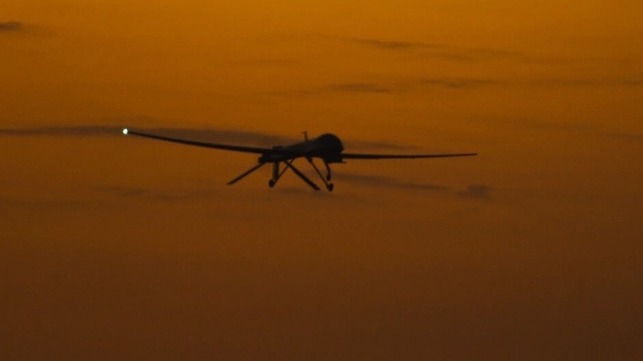Russia Attempts to Salvage Downed American Drone in Black Sea

The Russian government plans to attempt to recover the wreckage of an American drone that was struck by a Russian fighter over the Black Sea earlier this week, according to a member of the Russian Security Council.
On Tuesday, the Pentagon reported that a U.S. military-operated MQ-9 Reaper drone was forced down in the Black Sea when a Russian fighter hit its propeller. The U.S. State Department described the incident as a "brazen violation of international law"; the Kremlin, however, has denied that any contact between the aircraft occurred.
The unarmed MQ-9 Reaper drone - a remote-controlled surveillance/attack drone weighing about 12,000 pounds - went down in deep water about 75 miles south of the Crimean Peninsula on Tuesday morning. Two Russian Su-27 fighter jets intercepted the slow-moving drone, and after flying past it at high speed, they repeatedly dumped fuel on it, according to the Pentagon. At about 0700, one of the jets struck the MQ-9's propeller, causing it to crash in the Black Sea.
The U.S. Navy has no surface vessel assets in the Black Sea with which to mount a recovery operation, and the Bosporus has been closed to naval vessels since the beginning of the invasion of Ukraine last year. The Russian Navy is a dominant force in the region, but it is uncertain if it has ability to find and recover a small aircraft - or pieces of an aircraft - in mile-deep water with its available assets.
“I don’t know if we can recover [the wreckage] or not, but we will certainly have to do that," said Russian Security Council secretary Nikolai Patrushev in a televised address Wednesday.

that matters most
Get the latest maritime news delivered to your inbox daily.
U.S. defense officials have confirmed that Russia has deployed vessel assets to search for the downed drone, though they stressed that its intelligence value was limited.
"It probably broke up. There's probably not a lot to recover, frankly," Joint Chiefs of Staff chairman Gen. Mark Milley said Wednesday. "As far as the loss of anything of sensitive intelligence . . . as normal we would take and we did take mitigating measures."
